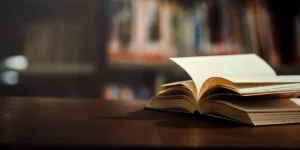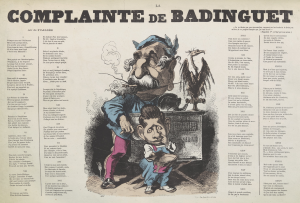Thanks to the sterling efforts of colleagues in Collections and Academic Liaison (CAL), a hitherto underutilised section of the Royal Commonwealth Society (RCS) library has recently been catalogued. 2252 titles running to almost 79 metres of shelving under the ‘Foreign colonies’ classification have now been added to iDiscover. Previously these titles were only discoverable through a labyrinthine card catalogue situated in the Rare Books Reading Room at Cambridge University Library; potential users had to know of the existence of this collection and had to physically visit the UL to access the card catalogue.
Continue reading “Cataloguing of the Royal Commonwealth Society Library’s ‘Foreign colonies’ section”Category: French
Illustrated books and humour in Cambridge University Library’s Liberation collection (1944-1946)
This year will mark the 80th anniversary of the Normandy landings and the Liberation of France from German occupation, at the end of the Second World War. As part of the ongoing promotion of and research into Cambridge University’s Library Liberation collection (1944-1946), we have been delighted to shed light on Sophie Dubillot’s AHRC-funded collaborative (Cambridge UL and Open University) PhD project: ‘Ce n’est pas une blague: Purposes and Limits of Visual Humour in Early Post-War France (1944-46)’ and on the Liberation Collection (1944-46) Visiting Scholarship at Cambridge UL, whose first recipient will be announced in the next few weeks. We would be very happy to welcome you on Tuesday 19th March, 5-6pm at the Faculty of Divinity on the Sidgwick site, for Sophie Dubillot and Irène Fabry-Tehranchi’s talk on the Liberation collection: Illustrated books and humour in Cambridge University Library’s Liberation collection (1944-46), as part of the Cambridge Festival (you can register here).
This talk will examine a selection of the Liberation collection’s illustrated works (ranging from deluxe fundraising anthologies to commemorative works, clandestine printing and poetry), as well as humorous drawings representing struggles (such as restrictions, housing issues, and missing family members), in an ideologically divided country in dire need of reconstruction.
Irène Fabry-Tehranchi
Percy Cruikshank’s Panorama of the Franco-Prussian war (1870) in context
Two years ago, Cambridge University Library acquired a satirical pocket-size (but 3 meters long, once unfolded) Panorama of the Franco-Prussian war by Percy Cruikshank (1870) (8000.e.354). This work is a good complement to the library’s Collection of 1870-71 Franco-Prussian caricatures from a British perspective. In a talk taking place on Thursday 7 March from 5-6pm in the University Library’s Milstein room, as part of the Cambridge History of Material Texts seminar, we are going to present Cruikshank’s panorama and contextualise this work within the author’s creation of other comic cartoons produced in the concertina format.
Continue reading “Percy Cruikshank’s Panorama of the Franco-Prussian war (1870) in context”
La Complainte de Badinguet by André Gill (1870): translation and exhibition
A new exhibition of a selection of facsimiles of Cambridge University Library’s collection of 1870-71 caricatures is opening on 12 February at the Seeley Library (History faculty). This accompanies an ongoing translation project. This year, Geordie Cheetham worked on the translation and commentary of the song “La Complainte de Badinguet” (Badinguet’s Lament, CUL, KF.3.9, p. 162), published in Paris c. 1870 and attributed to the caricaturist, painter and song-writer André Gill (1840-1885).
This satirical piece imagines the (by that point former) French Emperor Napoleon III writing a lament following his defeat and capture in the Franco-Prussian war (1870-71). He was nicknamed ‘Badinguet’ after the name of a worker who helped him escape from prison following an attempted coup in 1846. The image shows the demoted emperor playing a barrel organ inscribed “Sedan” and his son Louis-Napoléon Bonaparte picking his nose and making a collection, accompanied by a skeletal eagle. Continue reading “La Complainte de Badinguet by André Gill (1870): translation and exhibition”
“Chameleonic games” in the 1870-71 caricatures collections
If over the recent holidays you have been roped into playing party games, which ones would you have encountered in 1870-71? Among the latest paper cut-out games and board games, fully engaging with contemporary historical and political events, Parisians of the time could have tackled the two “Jeux caméléoniens”, or Chameleonic Games by Louis-Valentin-Émile de La Tremblais, a painter and draughtsman probably of aristocratic origin.

The Liberation Collection (1944-46) Visiting Scholarship, Cambridge University Library
Cambridge University Library is delighted to announce the launch of the Liberation Collection Visiting Scholar Programme. Generously supported by the Penchant Foundation, this new initiative will enable a Visiting Scholar to spend between two and four months undertaking research focused on the Chadwyck-Healey Liberation Collection held at Cambridge University Library.
This programme is a collaboration between the University Library Research Institute and Clare Hall, a graduate college located at the heart of the University of Cambridge, renowned for its informal approach to college life and its international diversity. The maximum value of the scholarship is £6000 for UK-based applicants and £7000 for international applicants.

Ville de Toulouse, Octobre 1944. Liberation.a.235
Special issue of the city bulletin of Toulouse published after the liberation of the city in August 1944.
Purposes and Limits of Visual Humour in Early Post-War France through Cambridge UL’s Liberation collection (1944-46)
We are delighted to share the new webpage designed by the University Library Research Institute (ULRI), for the AHRC-funded doctoral award on France and the Second World War, a collaborative project of the Open University and Cambridge University Library.
The PhD candidate, Sophie Dubillot, previously contributed to this blog pieces on the French résistante Madeleine Riffaud and the collaborationist Auguste Liquois; the résistant priest Père Jacques de Jésus (who inspired Louis Malle’s 1987 film Au revoir les enfants) and Julien Unger’s Le sang et l’or : souvenirs de camps allemands (1946).
Sophie is using material from the Chadwyck-Healey Liberation Collection and the abundant press of the Liberation period to examine humorous drawings in the immediate aftermath of the Second World War in France (1944-46). Her project aims to examine visual humour’s forms, functions, and limits at a time when the French had to negotiate the delicate post-war transition back to peace. Sophie’s research focuses on how humour served to redefine the French nation in the early post-war period and how different influences on the drawings encouraged or stifled particular voices.
Irène Fabry-Tehranchi
France and the restitution of cultural property
The question of restitution of spoliated cultural works currently engages most European countries, especially former colonizing nations. It came into the forelight in France when President Emmanuel Macron advocated for the “return of African heritage” during a visit to Burkina Fasso in 2017. This blog post will look at the headlines of France’s handling of the question of restitution with the details of related books inserted throughout.
Macron commissioned a study by two academics, Bénédicte Savoy (then History professor at the Collège de France in Paris, now at the Technical University of Berlin) and Felwine Sarr (a writer, then Economics professor at Gaston Berger University, Senegal, now in the Romance studies department at Duke University, US). Their report on The Restitution of African cultural heritage: Toward a New Relational Ethics was published in 2018: it examined the history and current state of publicly owned French collections of African artworks originating from illicit or disputed acquisitions, as well as claims and recommendations for preparing restitutions. From a wider perspective, they recommended international and inter-African cooperation, improved access to research, archives and documentation (including through digitisations), to fill the gap relating to the preservation, study and wider appreciation of African culture. This would imply training, circulation of temporary exhibitions, as well as educational initiatives to ensure transmission of African cultural heritage.
- Objets du désir, désir d’objets : Leçon inaugurale prononcée le jeudi 30 mars 2017 / Bénédicte Savoy. Paris : Collège de France, 2017, ebook
- Restituer le patrimoine africain / Felwine Sarr, Bénédicte Savoy. Paris : Philippe Rey, 2018. C207.d.5916
- Afrikas Kampf um seine Kunst : Geschichte einer postkolonialen Niederlage / Bénédicte Savoy. München : C.H. Beck, 2021, EBSCO ; Africa’s struggle for its art : history of a postcolonial defeat ; transl. Susanne Meyer-Abich. Princeton University Press, 2022. C218.c.8787 and de Gruyter eBooks; Le long combat de l’Afrique pour son art : histoire d’une défaite post-coloniale. Éditions du Seuil, 2023. C219.c.6031 Continue reading “France and the restitution of cultural property “
Event “French Collections in UK Libraries: Discovery, Research, Dissemination” at the Institut Français (London)
We are delighted to share the programme and free online registration for a one-day seminar which will take place at the Institut Français in London on the 20th of November 2023, with the sponsorship of the French Studies Library Group. Cambridge French collections are very well represented, as it includes talks on University Library collections, the 1870-71 Franco-Prussian caricatures and Chadwyck-Healey Liberation collection (1944-45), as well as Trinity College holdings, with the Crewe Collection of English and French literature and the Kessler artist books collection.

This event brings together leading specialists from academia, libraries and the book trade to explore French printed, archival, and digital collections in all their richness and diversity from across the United Kingdom. Found in major public institutions as well as hidden in lesser-known collections, they reflect the British Isles’ continuous engagement with France. Themes include collections of caricatures; the Second World War; Artists’ Books; Anglo-French collectors and their collections; and the French community in Britain. We will also consider how libraries shape research, and how they can play a role in cultural diplomacy. The event, which will provide a unique opportunity to foster the interpretation, promotion, and enjoyment of these collections, is aimed at a wide audience and will include ample time for discussion and networking. Continue reading “Event “French Collections in UK Libraries: Discovery, Research, Dissemination” at the Institut Français (London)”
Till Eulenspiegel through the ages

In Britain the character of Robin Hood is a well-known folklore figure. An equivalent figure in Germany might be Till Eulenspiegel, perhaps best known here from Richard Strauss’s tone poem Till Eulenspiegel’s merry pranks. As with Robin Hood there is fascination around the question of whether he is a fictional character or a real historical person. What we do know is that the earliest version of the Till Eulenspiegel story was published in the early 16th century in German, and this was followed by many editions and translations (see Further reading below for some facsimile editions of early works). The story has continued to be a popular one and this post will feature some different illustrated versions in our collections.
Till is often depicted with an owl and a mirror (as the name literally means owl-mirror). Here are a few more examples (click on each one to see enlarged version):




![20220705_150334a Panorama of the Franco Prussian War, painted by PC [Percy Cruikshank], London : F. Platts, 185 Fleet Street EC, & Mann Nephews, 39 Cornhill E.C., [1870-71].](https://europeancollections.files.wordpress.com/2022/08/20220705_150334a.jpg?w=341&resize=341%2C284#038;h=284)







